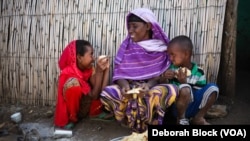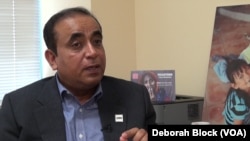Every year, Muslims donate millions of dollars to Islam-based charities, including those in the United States, during the holy month of Ramadan (this year, from May 15 to June 15).
The religion stipulates that Muslims must donate 2.5 percent of their wealth once a year to help the poor and needy, called zakat, an Arab term meaning “that which purifies.”
Although zakat can be given to any charity, including those that are not Muslim, the top three nonprofit Islamic charity groups in the United States receive a sizable amount of the donations.
“The idea is that the rich would give to the poor. It’s a way of getting close to almighty God,” said Belkacem Nahi, regional manager for Islamic Relief USA in Alexandria, Virginia, the largest nonprofit Muslim charity in the United States.
WATCH: US Muslims Celebrate Ramadan in Different Ways
Millions in zakat
The organization, which started 25 years ago, received $19.3 million in zakat contributions in 2017, and expects to receive at least that much this year.
“We do a lot of grassroots work. We go to mosques. We go to the private sector and talk to them about the benefit of zakat,” Nahi said.
And with 3.3 million Muslims in the United States, 1 percent of the total population, the major Islamic charity groups work to get a portion of the zakat.
The groups compete for the donations "using everything from the internet to visiting mosques," an especially good source for zakat, said Arif Mehmood, M.D., programs director for Alexandria-based United Muslim Relief. He said 70 percent of the zakat the organization takes in goes directly to humanitarian programs worldwide.
Nahi said Islamic Relief USA receives anywhere from “$25 to a $1 million, depending on the person’s wealth.” He added that “people who give extra zakat will receive more of a reward from God, while helping those in need.”
There are “Islamic regulations in place” for determining how much zakat a person should give, Nahi said. The total would include things such as investments, ownership of gold and silver, as well as individual savings.
Islamic Relief USA and other Muslim charity groups have zakat calculators on their websites.
Nahi said the money is used “anywhere where there is a need, including Africa, Asia and in the United States.”
In the U.S., he said, “we have food programs for the poor, disaster relief teams, and help medical clinics for low-income people.”
He said his group is currently helping many Syrian refugees in the United States, but emphasizes that aid goes to anyone in need, not just Muslims.
“Poverty does not know religion. When you are hungry, it doesn’t matter what religion you are,” said Halil Demir, executive director of the Zakat Foundation of America, located near Chicago.
Charitable needs
Besides international relief, the foundation is helping the homeless in the U.S., and paying rent and medicine for refugees. The group delivered food to Puerto Rico after Hurricane Maria devastated the island last year.
Shaykh Abdool Rahman Khan, an official with the grassroots Islamic Circle of North America, said he believes the majority of Muslims in the United States are giving zakat.
But Zeid Abdalla, a 26-year-old Muslim in Washington, said he is not giving zakat right now because money is tight. The Tunisian native said it is hard to keep afloat in an expensive city.
Khalil Hassan, also in his 20s and living in suburban Washington, said he makes sure he gives his annual donation because, “it is my duty as a Muslim to do this and help others.”
Mohammed Amir, a devout Ethiopian who often goes to a mosque with his wife and two children, has similar feelings. “We believe on the day of judgment with God, we will have to answer about whether we gave zakat,” he said.
Nahi said people who are poor and not able to donate have other ways of fulfilling their duty.
“They can volunteer for charity organizations, for example. It’s not just about the money. We believe you have to give with whatever God gives you," he said.








